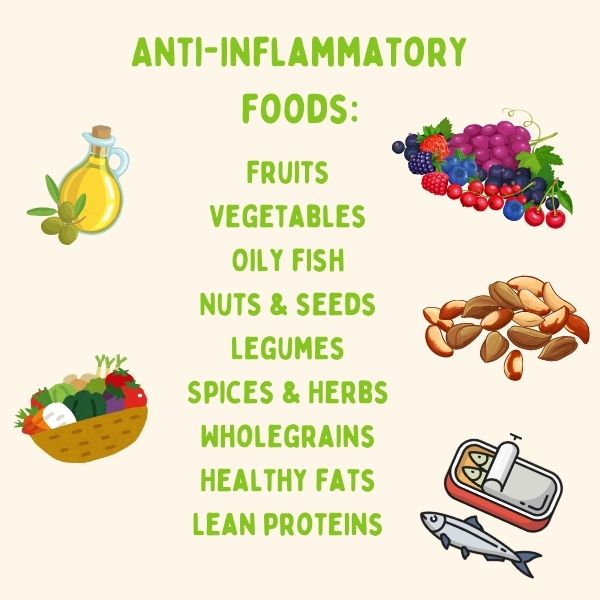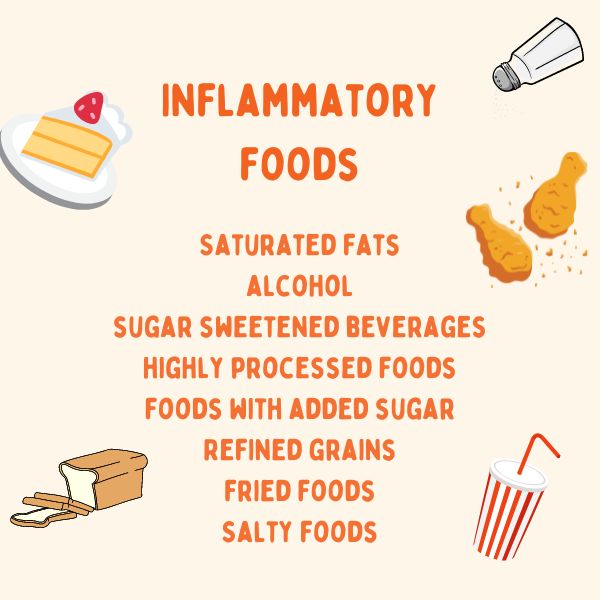A good quality PCOS diet includes a range of fibre rich foods, nourishing healthy fats, high quality proteins and foods that provide sources of antioxidants, especially from plenty of fruits and vegetables. When looking at a PCOS diet plan, the types of carbohydrate sources are important, with ideally the majority of carbohydrate intake coming from wholegrain sources, to help ensure blood sugar is kept stable and to prevent big dips or spikes in energy.
What is a PCOS diet?
A PCOS diet plan will contain a range of nutritious foods, including lean and varied protein sources, plenty of fibre rich foods from fruits, vegetables, salads, legumes, and frequent intake of good quality healthy fats such as nuts, seeds, olive oils, avocados etc. We also encourage those who follow a PCOS diet plan to include carbohydrates in moderation, choosing wholegrain and high fibre sources as much as possible.
Why does a PCOS diet matter?
Women who have PCOS are at an increased risk of developing health concerns such as chronic inflammation, obesity, insulin resistance and metabolic syndrome. Having this can then increase risk of developing conditions such as type 2 diabetes.
Research has shown that insulin resistance is a condition that can influence around 65-70% of those with PCOS. Insulin is the key hormone that allows the cells to uptake the glucose from the blood, into the cells, to be used as energy. Insulin resistance is where the insulin produced by the pancreas is not recognised by the cells, meaning that the sugar remains in the blood, which can increase the risk of type 2 diabetes.
A diet higher in refined carbohydrates such as starchy and processed foods, can increase insulin resistance
Not every woman with PCOS has insulin resistance, but health and lifestyle changes can ensure that the risk of developing further symptoms can be reduced and better managed, especially through dietary changes.
The likelihood of insulin resistance can also be increased with having a higher body mass index (BMI). This is because having insulin resistance can make it harder for weight loss to occur.
How does a PCOS diet help for polycystic ovary syndrome (PCOS)?
There is no specific diet for those with PCOS, however, various dietary approaches can help to support those who struggle with symptoms of PCOS. This includes looking at a diet that has a low glycaemic index (GI). The lower the GI of a certain food, the more slowly it is digested and broken down. This means lower GI foods cause smaller rises in blood sugar, leading to less insulin being released by the pancreas. Generally, lower GI foods include fruits, vegetables, pulses, wholegrains, nuts & seeds, as well as legumes like beans.
It is understood that women with PCOS are also likely to have higher levels of chronic inflammation. Many mechanisms can play a role in this, including diet induced inflammation, as well as hyperandrogenism (excess amount of certain sex hormones such as testosterone) and other hormonal imbalances. Therefore, regularly including anti-inflammatory foods can support those with higher blood sugar levels and chronic inflammation. Foods with anti-inflammatory compounds include oily fish, berries and avocados.
A PCOS diet can also focus on reducing the overall number of cysts on the ovaries, and can improve insulin resistance, glucose management and blood lipid control.
PCOS diets
PCOS diet plan to get pregnant
Having PCOS can impact fertility, largely due to insulin resistance. This can lead to irregular mensuration and can also impact the release of eggs from the ovaries during ovulation. Therefore, adapting to a diet to manage the insulin levels can help to improve hormonal balance, particularly the higher androgen hormones present.
Low glycaemic index foods can help to better manage spikes in blood sugars, which can then help to control insulin levels. Foods with a lower glycaemic index will be digested more slowly, keeping blood sugar and insulin levels more stable, and can improve overall symptoms.
Low glycaemic index foods include lean proteins, fruits & vegetables, whole grains, legumes and nuts & seeds.
PCOS diet plan to lose weight
Weight loss has been well established to help reduce insulin resistance, a key factor with PCOS. Including foods that support with weight loss will encourage better insulin management. This includes a diet that is rich in fruits and vegetables, as well as lean proteins such as chicken, fish and tofu, healthy fats sources, and a moderate to lower intake of carbohydrates. Creating a calorie deficit will allow for weight loss to occur, which will then improve the resistance to insulin.
Including fibre rich foods in the diet will firstly help to bulk out the meals to keep us fuller for longer, and also will slow down digestion time, reducing blood sugar spikes. Fibre rich foods will come from fruit and vegetables, as well as pulses like beans and lentils, wholegrains and some nuts and seeds.
Keto diet for PCOS
A ketogenic (keto) diet will restrict carbohydrates to less than 5% of total energy intake. On average, that is around 40-50g carbohydrates per day, depending on your weight.
A keto diet can aid weight loss, as it reduces the carbohydrates in the diet, which can improve insulin resistance. It has been shown to work well for those with type 2 diabetes, so similar principles have been applied for those with PCOS. Research also shows that going on a ketogenic diet can help regular menstural cycles.
Insulin resistance can lead to fat storage, and it has been shown that high insulin levels with insulin resistance can lead to weight gain. The keto diet can help to improve the insulin sensitivity, which can then be helpful for those who are diagnosed with PCOS.
A typical ketogenic diet will exclude (or be very low in): all carbohydrates, including breads, rice, pastas, cereals, potatoes, most fruits and some vegetables. It will also exclude any foods with sugar.
Instead, foods such as animal proteins, a small amount of dairy and vegetables and very low carbohydrate fruits may be included.
PCOS acne diet
Acne can be one of the symptoms of having PCOS. Research has shown that women with acne typically have higher insulin and blood sugar levels compared to those without acne. Therefore, eating a diet that can help to reduce insulin resistance can play a role in reducing acne.
Another link between PCOS and acne is gut health. Dysbiosis, an imbalance of gut bacteria, can trigger symptoms of PCOS such as the insulin resistance, as shown by previous studies.
Including a balance of proteins, fats and fibres in the diet can help to manage acne related to PCOS. The fibres are in relation to foods such as fruits, non-starchy vegetables, beans and pulses, as well as whole grains like quinoa, brown rice and oats. Many of these foods contain prebiotics, which are a type of fibre that helps to feed the healthy bacteria in the gut. This in turn can reduce inflammation, which can impact skin health. Therefore, keeping our gut bacteria healthy can have a role to play in the acne process.
Reducing added sugar intake also contributes to the quality of skin. Consuming high levels of added sugar can impact testosterone levels, worsen the insulin resistance and also PCOS acne. Be mindful of hidden sugars in products such as baked goods, certain drinks, granola bars or flavoured yoghurts.
The link between dairy and acne is very individualised. A small amount of research shows that increased frequency of acne is linked to those who consume more milk. However, this is not applicable to all with PCOS, as some are able to tolerate dairy without having an impact on symptoms.
Low carb diet for PCOS
This diet reduces carbohydrates in the average diet – not to the level of a ketogenic diet, but to around 20% of overall calorie intake. Going on a lower carbohydrate diet can help to reduce body weight in overweight or obese populations, as well as reducing insulin levels and improving insulin resistance. A meta-analysis of many studies showed that a lower carb diet can also improve hyperandrogenism, a main reason for acne. The weight loss that is associated with a low carb diet can lead to a reduction in fat tissue, therefore improving the conversion of androgens.
PCOS vegan diet
A high quality diet suitable for those who have PCOS and are vegan can come with some challenges, but this diet can also provide many benefits. Being able to include a wide variety of fibrous foods from naturally vegan sources can support PCOS symptoms. Particularly with diets high in fibres, which can help to reduce chronic inflammation over time.
Choose from a range of fruits and vegetables, as well as a small amount of complex carbohydrates. High quality vegan proteins are important, specifically tempeh, tofu and other soy products, lentils and beans, and nuts and pulses.
What foods you should add to your PCOS diet?

Although a specific PCOS diet is not available, it is generally recommended to focus on unprocessed foods, including a range of fruits, vegetables, lean proteins, whole grains and fibrous foods. This specifically includes:
- Fresh or frozen fruits and vegetables, such as apples, berries, grapes, pineapple, spinach, cauliflower, carrots, parsnips, green leafy vegetables etc.
- Fibre rich beans and pulses, such as chickpeas, kidney beans, puy lentils or green lentils
- Nuts and seeds, including almonds, walnuts, chia seeds, pumpkin seeds.
- High quality proteins, such as lean chicken or turkey, fish such as salmon or mackerel (a bonus if it is an oily fish), as well as vegetarian proteins like beans, lentils, eggs, soy products e.g. tofu or tempeh
- Healthy fat intake, through foods such as nuts and seeds, but also avocados, good quality olive oil, olives and oily fish
- A smaller intake of wholegrains like wholemeal pasta or brown rice, oats and barley
- A reasonable intake of dairy, such as cottage cheese, Greek yoghurt and small amounts of other cheeses
- A range of fresh or dried herbs and spices. This can include ginger, turmeric and cumin, or cinnamon.
- Moderate dark chocolate and/or green tea intake
- Fermented foods such as kefir, kimchi or kombucha, as well as live yoghurt. This may help support PCOS and gut health.
What foods you should avoid in your PCOS diet?

There are foods which can contribute to symptoms of PCOS, that are encouraged to reduce. Particularly, these are pro-inflammatory foods, including:
- Foods high in salt (sodium), such as savoury snacks, pastries and takeaways
- Sugary foods and beverages, particularly soft drinks and processed snacks
- Foods high in refined carbohydrates, such as baked goods and white bread
- Red meat such as beef, lamb and pork
- Processed meats, such as bacon and sausages
- Processed snacks, including sweetened yoghurts, ice creams, crisps and flavoured nuts
- Fried foods, including chips and fast food
Can you lose weight with a PCOS diet?
Yes, weight loss can be achieved with a PCOS diet. The best diet for PCOS weight loss is one that you are able to stick to for long term success and consistency. Creating a PCOS weight loss diet plan should include plenty of the foods in the above section of what to add in a PCOS diet, and should be reviewed by a health professional, to ensure it is realistic and provides you with all your nutrients needed to support a healthy lifestyle.
A PCOS diet should contain low GI foods, be high in fibre, and provide a range of quality sources of healthy fats and lean proteins. Fermented foods such as kombucha and kefir can be included. This is because healthy gut bacteria can have a positive influence on weight loss, and it has been shown that those with PCOS may have less diversity of healthy gut bacteria than those without this condition. The PCOS diet should contain low levels of processed and convenience foods, as these often contain high levels of added salts and sugars, which are linked to increased weight and insulin resistance. A high intake of sugary foods and beverages may contribute to more chronic low-grade inflammation, a key factor of PCOS.
Other tips of a PCOS diet
There are other factors to consider when designing a PCOS diet to support your lifestyle and symptoms.
Look at the quality of micronutrients in the diet. For example, it is important to consume enough of certain vitamins and minerals, which have been found to be lower in those with PCOS. Included in this is the micronutrient magnesium. In fact, women with PCOS are 19 times more likely to be deficient in magnesium than those without PCOS. Good quality sources of magnesium include healthy fats such as nuts, seeds and avocado, as well as green leafy vegetables and beans.
Omega 3 fatty acids are a powerful source of nutrients, that can aid in the reduction of chronic inflammation associated with PCOS. Including a regular intake of omega 3 sources into your PCOS diet plan can help to support healthier triglyceride levels, as well as supporting fertility, by improving egg quality and ovulation. Omega 3 has also been found to support with reducing androgen levels, and improving mood.
The concept of mindful eating is something that should be practised by those with PCOS. This allows an increased awareness of the cues of hunger and fullness, which can aid in weight loss, without going on a restrictive diet.
Aside from diet, exercise is a large part of managing PCOS symptoms. In particular, weight training has been shown to be beneficial for those with PCOS, helping to improve lean body mass, reducing visceral fat, testosterone and blood sugar. A regular exercise routine can also help support mental health. A large review of research showed that exercise is effective in improving health-related quality of life and PCOS symptom distress, with improvements in prevalence of depression and anxiety in women with PCOS.
Another area that exercise can support PCOS health is with reducing stress. High levels of chronic stress can increase levels of the stress hormone known as cortisol. Chronic levels of high cortisol have been linked with insulin resistance as well as weight gain. Overtime, this chronic stress can lead to increased risk of belly fat, which is linked to increased levels of inflammation. Stress management techniques are important to note when planning for a PCOS diet plan, such as meditation, yoga or journalling, alongside regular exercise.
Another way to support PCOS health is to improve sleep quality. Lack of sleep can increase the hunger hormone known as ghrelin. Higher levels of ghrelin can cause over eating, which can then lead to weight gain. In fact, a review showed that those who have insufficient sleep have been shown to be at higher risk of weight gain and obesity.
Those with PCOS may also consider supplementation, for further support to reduce symptoms.
For example, research into a supplement known as inositol has been shown to reduce insulin resistance, as well as improving egg quality and ovulation in those with PCOS. Curcumin supplementation also has anti-inflammatory effects, and has been shown to improve hyperandrogenism and support the reduction of insulin resistance. A common deficiency is vitamin D, where research has found that those with PCOS often have lower levels of vitamin D. Including a high quality vitamin D supplement into your routine will help to meet the recommended doses, as it can be difficult to meet recommendations of vitamin D through diet alone.
For further personalised support when looking for the right PCOS diet plan, reach out to our team of PCOS nutritionists & dietitians today.







